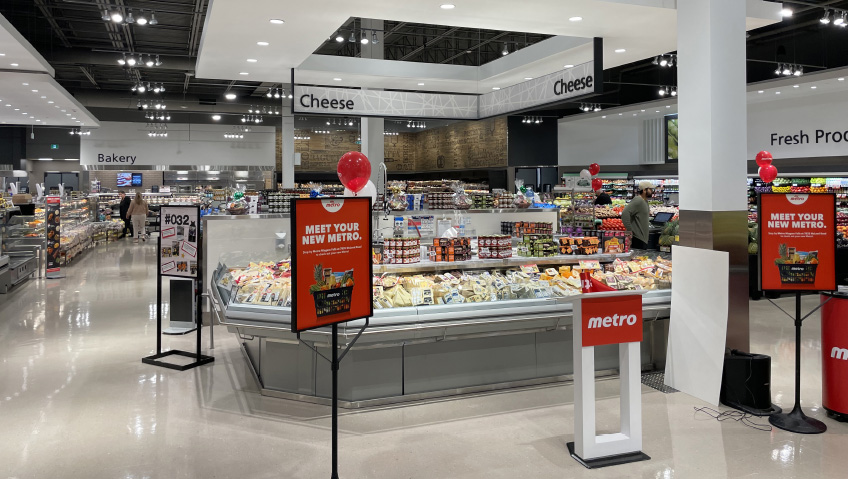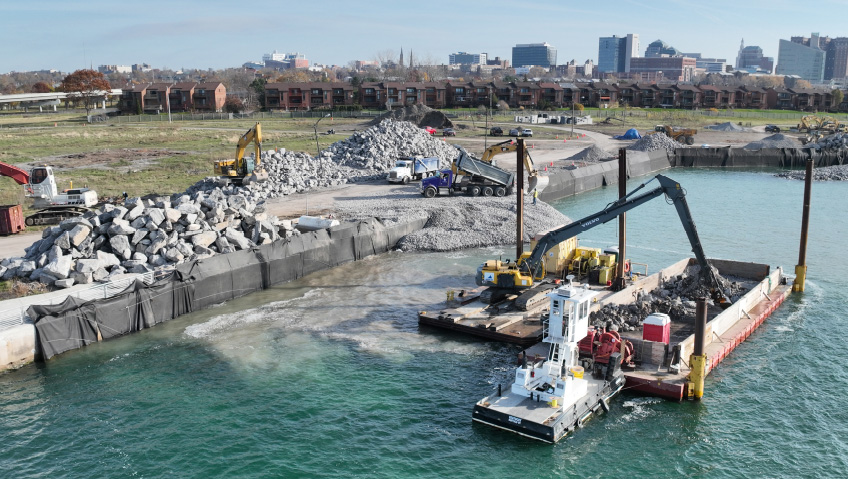Based in Vaughan, Ontario, Arsenal Constructors Inc. (ACI) is approaching its tenth anniversary as a full-service general contracting firm that excels at building and renovating grocery stores and commercial spaces. Its start-to-finish services cover everything from permits and paperwork to interior finishes and subcontracting trades. While focused on its home province at present, the company is open to establishing itself nationwide in the future.
ACI serves the corporate, restaurant, government, and retail sectors, and counts CP REIT, Domain Logistics, UBC, and Packall Packaging as clients. Still, most company revenue is derived from work in the grocery sector. Food giants such as Loblaws and Metro are “always renovating their stores. We’ll go in and do a complete renovation of the entire interior while they stay in business. We’ll also build new stores from the ground up or build small additions,” explains General Manager Steven Lanteigne.
Carpentry and some interior work, such as shelving and perimeter décor, are self-performed as Arsenal is a signatory to the United Brotherhood of Carpenters and Joiners. The firm arranges for talented trades to handle electrical, mechanical, roofing, and other tasks. As a well-regarded general contractor, the company can draw from a pool of dozens of subcontractors it has worked with in the past.
ACI’s services include pre-construction, project management, and post-construction work. “We’ll sit down with the client and review the task at hand. Depending on the services required and if we’re involved in the design, we’ll let the client know how we intend to go about this job: how we’re going to plan it, schedule it. We’re definitely going to talk about financials, whether we’ll do a high-level budget. We might set up a tender where we invite trades then sit down with the client and review it all,” Lanteigne explains.
Pre-construction tasks can also include managing the building permitting process, costs, site plan approval, and municipal bylaw variances plus estimating, scheduling, and subcontractor selection.
During the construction process, Arsenal provides project management services. Here the team’s duties range from supervising trades and sub-trades to site coordination, site meetings, cost management reviews, monitoring safety requirements, and maintaining schedules and timelines. Contracts and other documents regarding safety, budgets, and schedules are all prepared and reviewed.
Following construction, the team compiles a list of any remaining work based on an onsite audit, ensures all tasks are completed, and takes care of the appropriate documentation.
This template is flexible; while always thorough, the company can adapt to customer needs upon demand. “Every client is different,” notes Lanteigne. “Every client has their own culture and format for how they go about their business. It’s important, right off the bat, to really understand your client on those aspects.” Some grocery clients prefer to have construction done at an accelerated pace, while others prefer a slower pace, he shares.
While ACI has completed projects in other provinces, the firm aims to enhance its presence in Ontario for the time being. That said, an eventual expansion into other provinces has not been ruled out. “The door’s still open to go national. If we had a client who is national and they required us to be national, we’d definitely look at that, but there’s more than enough opportunity in our own province [at present],” says Lanteigne. Indeed, having built a reputation for quality work, Arsenal is in the enviable position of not having to constantly seek out new projects. “We get a lot of repeat work from existing clients,” he points out.
Arsenal traces its roots to a firm called International Fixture Installations (IFI), founded in 1996. IFI did interior renovations for companies such as Loblaws. The work was steady, but IFI executives decided to launch “a brand new general contracting company,” to “draw new clients and diversify our business,” explains Lanteigne.
As a result of this decision, Arsenal was founded in 2015. It initially did private design-build jobs and renovation work for grocery giant Metro. Soon, Metro hired the firm to handle additions and eventually, new builds. Work continued apace with Metro and other clients.
All was going well, but five years after the business was launched, COVID hit, causing panic among the public and massive disruptions to the economy. The work changed, too; one grocery client hired ACI to install Plexiglas barriers at counters at stores across Ontario.
Like other construction companies, Arsenal had to cope with supply chain woes caused by the pandemic. The pandemic closed ports overseas and factories in North America, resulting in huge delays in receiving parts and products. The resulting lockdowns also wreaked havoc on schedules. All contractors know it is unwise to agree to projects with overlapping timelines, notes Lanteigne, but thanks to COVID, many construction projects were either halted or scaled down. Staffing shortages were compounded by scheduling chaos; trades workers who were committed to one project often found themselves suddenly reassigned to other jobs. Construction and supply delays, plus unpredictable schedules among workers, resulted in “disarray” and coinciding commitments, he recalls.
Fortunately, “things have gotten better. Things are not 100 percent today, but are definitely a lot more manageable,” he adds.
There are still some lingering effects from the pandemic. Supply shortages, for example, have helped fuel inflation, and inflation plus rising interest rates have put some construction projects on pause as developers wait for the economy to improve.
Arsenal is also faced with the industry-wide challenge of attracting more young people to the trades and generating enthusiasm for construction and renovation jobs. To this end, the company endorses initiatives designed to raise awareness of career opportunities in the trades and the need for a strong work ethic.
“I think training is an important element for this industry to grow properly,” states Lanteigne. “A lot of unions are investing in training centers. We’ve been working in partnership with the United Brotherhood of Carpenters here in Ontario, Local 27. We’re currently working at one of their buildings; they’re expanding their training facility.”
Citing a common lament in construction circles, he says young people “are not really willing to jump into construction as much as in the past, but I think it’s a great opportunity for an excellent career, and financially, it’s very well-rewarding,” he adds.
For all these challenges, the company is keeping busy and working hard. ACI currently has 22 office employees and roughly 50 people who work in the field. Prospective job applicants would benefit from having a background in grocery store construction and renovation work, and a team spirit and a sense of loyalty also helps.
“A lot of [companies] today are having a problem with employees who keep jumping. They work for a year, then jump to another company… I want [new employees] who will commit with me long-term,” says Lanteigne.
Being safety-minded is also crucial for anyone who wants a job here. The company has a full-time safety manager who conducts site audits to make sure all safety procedures are being followed, and Arsenal has earned a Certificate of Recognition (COR) from the Infrastructure Health & Safety Association (IHSA), an Ontario-based workplace safety and health training provider.
“A couple years ago, we got COR certification. We had to go through a whole process—it took about a year. It was important to us as a company because even though there’s a lot of pressure to work at a fast pace, we cannot get away from the core value of working safe.”
Given that the company wants to expand, ingraining a safety-first ethos among staff is all the more important, he continues. “This COR certification was important to us because, as we’re growing, we’re taking on more risk; we’re taking on more responsibilities. As a general contractor, you’re the umbrella for everybody that works under you. You have an obligation to the public, to clients, to field personnel, to maintain a strict mandate on health and safety and lead by example,” says Lanteigne.
In addition to safety, integrity, collaboration, sustainability, and continuous improvement are other core Arsenal values.
Over the next few years, the company wants to enhance its relationships with existing clients, attract new customers, and gain “more recognition among our peers in the construction industry as a whole,” Lanteigne shares.
The company wants to take on more design-build projects as well. These would entail “working with clients directly and hiring everyone: the design team, interior decorating, engineering. We’re trying to focus on that,” he continues.
Arsenal is also closely following developments in the modular construction industry. In modular construction, large sections—or modules—of a building are manufactured off-site, then fitted together at the building location. “We have an interest in it, whether it’s corporate offices being built with partition systems or complete floors, walls, et cetera. We’re investigating that sector, because we feel the future could be there.”
Regardless of the direction the company eventually takes, lightning-fast expansion is not in the cards. “We want to grow at a modest pace. Overnight growth is not healthy. We want to make sure we’re growing at the right pace in order to maintain the work ethic and quality that we expect from ourselves.”






